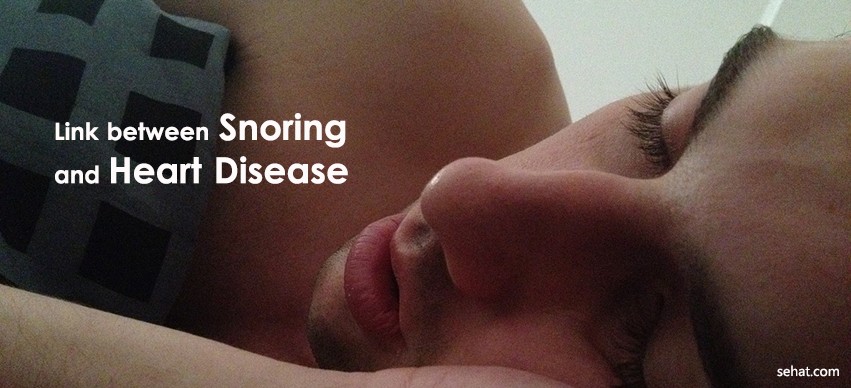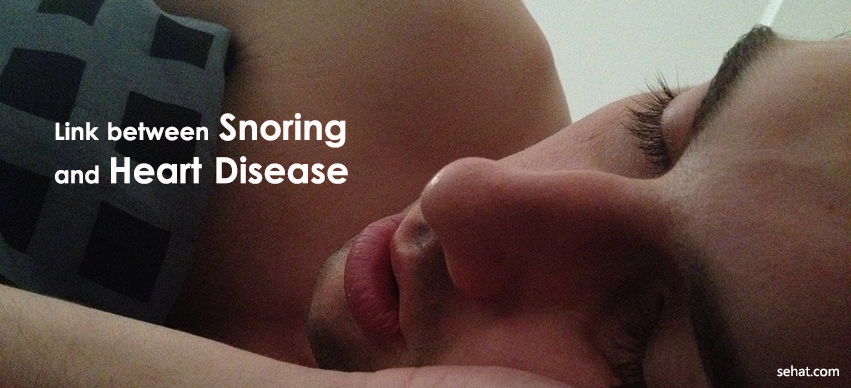
There are multiple causes of snoring and some of them are not detrimental to health. Those can be easily cured just by changing your sleeping postures or curbing on your habit of excessive alcohol consumption.
Scientists have now found out after a long-time research that obstructive sleep apnea results from a serious disorder and can up the risk of cardiovascular problem. It could indicate breaking down of cells in your veins.
Link between Snoring and Heart Disease
However, snoring can be a symptom of serious health issues, including cardiovascular problems. Let us take a quick look at how snoring could be a red flag for your heart health. A recent study by a group of doctors at Columbia University has identified a chain of events that define how the damage is caused in a step-wise manner.
- Of several problems that could cause heart attack is high blood pressure. If obstructed sleep apnea is not treated properly or in time, it could cause high blood pressure which may result in increased size of the heart, thereby being an alarming signal for strokes and heart attack.
- Snoring puts you at risk of increased chance of suffering cardiac arrhythmias, the most common form of which is arterial fibrillation. The problem is marked by significant fluctuations in natural rhythm of heart, accelerating or retarding otherwise regular heart beat. The problem could also manifest itself in irregular heart beat. Arrhythmia is usually benign in nature but if accompanied by snoring, it could be a sign of cardiac problem.
- Muscles in your airways always relax during your sleep. If those muscles come into the way of inhaled air, which causes sleep apnea, the body is deprived of required amount of oxygen for 40 seconds (maximum). Interrupted breathing negatively affects the line blood vessels and it is often the beginning of cardiovascular damages.
- The researchers have found that those afflicted with sleep apnea have a significantly higher level of CD59, a protein. Its chemical structure looks like a butterfly and it prevents the cells from being attacked by the immunity system of one’s body. However, concentration of CD59 in people with sleep apnea fails to safeguard the cells’ surface and instead makes them more prone to attacks by self-immune system of human body. The damaged cells cause obstruction to blood flow, leaving the people at risk to heart problems.
Possible Causes of Snoring
One of the causes of snoring is obstruction of air in its passage through the mouth and nose. There may be one or constellation of several reasons causing such obstruction.
- Obstruction in nasal airways: Some individuals snore only if they have allergy or a sinus infection. A deviated septum (a structural defect in nose that keeps two nostrils separated from each other) or nasal polyps can also cause snoring.
- Relaxed muscle in tongue and throat: Relaxed or poor muscle tone in tongue and throat easily collapse and thus, obstruct the airways. Such things can happen during sound sleep or result from excessive alcohol consumption and use of sleeping pills (though not all types). Normal process of aging also causes loosening of muscles.
- Uvula and/or long soft palate: A long uvula (the tissue dangling in the back of mouth) or a long soft palate can narrow the passage from nose to throat. Vibration in the structures cause them collide with each other, thereby obstructing the airways and you start snoring.
- Heavy throat tissue: Overweight people have bulky throat tissues which also cause snoring. Children having problem of adenoids and large tonsils also snore.
Tips on How to Stop Snoring:
- Change your sleep posture: Using a full-length body pillow, which will support your entire body, could prevent tongue and soft palate from falling back and narrowing the air passage. Such things happen when you recline on your back. Sleeping on either of sides could also prevent snoring. If change of posture does not solve your problem of snoring, consult a cardiologist.
- Avoid alcohol: It is claimed by some researchers that drinking alcohol on a moderate level is good for health. However, it will be better if you avoid taking alcohol before going to bed. Alcohol causes relaxation of muscles during sleep, which results into collapse of your throat muscle and in turn, causes snoring.
- Quit smoking: Smoking is injurious to your cardiovascular health. It damages the lining of throat and nasal cavity, which could lead to catarrh and swelling. Congested nasal passage creates difficulties in breathing through nose due to decreased airflow.
- Maintain healthy lifestyle: Overweight people usually snore more than others. Curb your extra pound and stick to a healthy diet. Extra fat to neck tissues narrows the air passage and obstructs air from flowing smoothly.
- Clean your nasal passage: Keeping your nasal passage clear will help you breathe easily. Make it a part of your regular cleaning program and stay safe from cardiovascular and other diseases caused by snoring.

